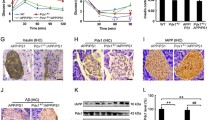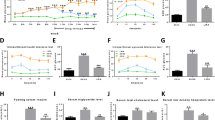Abstract
Diabetes-related cognitive impairment has been shown in diverse epidemiological investigations and lab-based studies, although the underlying pathological mechanisms remain unclear. Unbalanced protein homeostasis may contribute to cognitive decline by inducing abnormal protein aggregation in the diabetic brain. This study aimed to determine possible changes in the proteasome, which is an important pathway involved in abnormal protein degradation. To this end, we examined potential alterations of proteasomal subunits and hydrolytic activity in the brain of diabetic rats fed with high-fat diet combined with small doses of streptozotocin (STZ). Furthermore, lactacystin were used to inhibit proteasomal activity in vivo and typical Alzheimer’s disease (AD)-like pathologies were detected, including amyloid-beta, tau phosphorylation, and oxidative protein changes. Our results showed that proteasomal activity increased in the brains of diabetic rats compared to age-matched control rats. After proteasome inhibition, the levels of tau phosphorylation and protein oxidative modification significantly increased; however, no changes were detected in the pathway involved in amyloid production. These results indicated that changes in protein homeostasis balance in diabetes play a role in some typical AD-like changes, especially in oxidative protein degradation, providing evidence that prevention of diabetes-induced protein imbalance may be a potential therapeutic target.





Similar content being viewed by others
Data availability
The datasets generated during the current study are available from the corresponding author on reasonable request.
References
Ahn K, Erlander M, Leturcq D, Peterson PA, Fruh K, Yang Y (1996) In vivo characterization of the proteasome regulator PA28. J Biol Chem 271(30):18237–18242. https://doi.org/10.1074/jbc.271.30.18237
Aiken CT, Kaake RM, Wang X, Huang L (2011) Oxidative stress-mediated regulation of proteasome complexes. Mol Cell Proteomics 10(5):R110006924. https://doi.org/10.1074/mcp.M110.006924
Ampofo AG, Boateng EB (2020) Beyond 2020: Modelling obesity and diabetes prevalence. Diabetes Res Clin Pract 167:108362. https://doi.org/10.1016/j.diabres.2020.108362
Balbaa M, Abdulmalek SA, Khalil S (2017) Oxidative stress and expression of insulin signaling proteins in the brain of diabetic rats: Role of Nigella sativa oil and antidiabetic drugs. PLoS One 12(5):e0172429. https://doi.org/10.1371/journal.pone.0172429
Ben-Nissan G, Sharon M (2014) Regulating the 20S proteasome ubiquitin-independent degradation pathway. Biomolecules 4(3):862–884. https://doi.org/10.3390/biom4030862
Breusing N, Grune T (2008) Regulation of proteasome-mediated protein degradation during oxidative stress and aging. Biol Chem 389(3):203–209. https://doi.org/10.1515/BC.2008.029
Chakraborty A, Hegde S, Praharaj SK, Prabhu K, Patole C, Shetty AK, Mayya SS, Acharya RV, Hande HM, Prabhu MM, Upadhya D (2021) Age Related Prevalence of Mild Cognitive Impairment in Type 2 Diabetes Mellitus Patients in the Indian Population and Association of Serum Lipids With Cognitive Dysfunction. Front Endocrinol (Lausanne) 12:798652. https://doi.org/10.3389/fendo.2021.798652
Chen J, Zhan L, Lu X, Xiao C, Sun N (2017) The Alteration of ZiBuPiYin Recipe on Proteomic Profiling of Forebrain Postsynaptic Density of db/db Mice with Diabetes-Associated Cognitive Decline. J Alzheimers Dis 56(2):471–489. https://doi.org/10.3233/JAD-160691
Chen YJ, Tang ZZ, Du L, Liu Y, Lu Q, Ma TF, Liu YW (2019) A novel compound AB-38b improves diabetes-associated cognitive decline in mice via activation of Nrf2/ARE pathway. Brain Res Bull 150:160–167. https://doi.org/10.1016/j.brainresbull.2019.05.010
Cole JB, Florez JC (2020) Genetics of diabetes mellitus and diabetes complications. Nat Rev Nephrol 16(7):377–390. https://doi.org/10.1038/s41581-020-0278-5
De Felice FG, Ferreira ST (2014) Inflammation, defective insulin signaling, and mitochondrial dysfunction as common molecular denominators connecting type 2 diabetes to Alzheimer disease. Diabetes 63(7):2262–2272. https://doi.org/10.2337/db13-1954
Ebstein F, Kloetzel PM, Kruger E, Seifert U (2012) Emerging roles of immunoproteasomes beyond MHC class I antigen processing. Cell Mol Life Sci 69(15):2543–2558. https://doi.org/10.1007/s00018-012-0938-0
Ethen CM, Hussong SA, Reilly C, Feng X, Olsen TW, Ferrington DA (2007) Transformation of the proteasome with age-related macular degeneration. FEBS Lett 581(5):885–890. https://doi.org/10.1016/j.febslet.2007.01.061
Gao H, Jiang Q, Ji H, Ning J, Li C, Zheng H (2019) Type 1 diabetes induces cognitive dysfunction in rats associated with alterations of the gut microbiome and metabolomes in serum and hippocampus. Biochim Biophys Acta Mol Basis Dis 1865(12):165541. https://doi.org/10.1016/j.bbadis.2019.165541
Gold SM, Dziobek I, Sweat V, Tirsi A, Rogers K, Bruehl H, Tsui W, Richardson S, Javier E, Convit A (2007) Hippocampal damage and memory impairments as possible early brain complications of type 2 diabetes. Diabetologia 50(4):711–719. https://doi.org/10.1007/s00125-007-0602-7
Grune T, Jung T, Merker K, Davies KJ (2004) Decreased proteolysis caused by protein aggregates, inclusion bodies, plaques, lipofuscin, ceroid, and “aggresomes” during oxidative stress, aging, and disease. Int J Biochem Cell Biol 36(12):2519–2530. https://doi.org/10.1016/j.biocel.2004.04.020
Hussong SA, Kapphahn RJ, Phillips SL, Maldonado M, Ferrington DA (2010) Immunoproteasome deficiency alters retinal proteasome’s response to stress. J Neurochem 113(6):1481–1490. https://doi.org/10.1111/j.1471-4159.2010.06688.x
Keck S, Nitsch R, Grune T, Ullrich O (2003) Proteasome inhibition by paired helical filament-tau in brains of patients with Alzheimer’s disease. J Neurochem 85(1):115–122. https://doi.org/10.1046/j.1471-4159.2003.01642.x
Keller JN, Hanni KB, Markesbery WR (2000) Impaired proteasome function in Alzheimer’s disease. J Neurochem 75(1):436–439. https://doi.org/10.1046/j.1471-4159.2000.0750436.x
Kelmer Sacramento E, Kirkpatrick JM, Mazzetto M, Baumgart M, Bartolome A, Di Sanzo S, Caterino C, Sanguanini M, Papaevgeniou N, Lefaki M, Childs D, Bagnoli S, Terzibasi Tozzini E, Di Fraia D, Romanov N, Sudmant PH, Huber W, Chondrogianni N, Vendruscolo M, Cellerino A, Ori A (2020) Reduced proteasome activity in the aging brain results in ribosome stoichiometry loss and aggregation. Mol Syst Biol 16(6):e9596. https://doi.org/10.15252/msb.20209596
Kish-Trier E, Hill CP (2013) Structural biology of the proteasome. Annu Rev Biophys 42:29–49. https://doi.org/10.1146/annurev-biophys-083012-130417
Komura H, Kakio S, Sasahara T, Arai Y, Takino N, Sato M, Satomura K, Ohnishi T, Nabeshima YI, Muramatsu SI, Kii I, Hoshi M (2019) Alzheimer Abeta Assemblies Accumulate in Excitatory Neurons upon Proteasome Inhibition and Kill Nearby NAKalpha3 Neurons by Secretion. iScience 13:452–477. https://doi.org/10.1016/j.isci.2019.01.018
Kuehn L, Dahlmann B (1996) Reconstitution of proteasome activator PA28 from isolated subunits: optimal activity is associated with an alpha, beta-heteromultimer. FEBS Lett 394(2):183–186. https://doi.org/10.1016/0014-5793(96)00946-5
Li ZG, Zhang W, Sima AA (2007) Alzheimer-like changes in rat models of spontaneous diabetes. Diabetes 56(7):1817–1824. https://doi.org/10.2337/db07-0171
Mauricio D, Alonso N, Gratacos M (2020) Chronic Diabetes Complications: The Need to Move beyond Classical Concepts. Trends Endocrinol Metab 31(4):287–295. https://doi.org/10.1016/j.tem.2020.01.007
Moreno-Gonzalez I, Edwards Iii G, Salvadores N, Shahnawaz M, Diaz-Espinoza R, Soto C (2017) Molecular interaction between type 2 diabetes and Alzheimer’s disease through cross-seeding of protein misfolding. Mol Psychiatry 22(9):1327–1334. https://doi.org/10.1038/mp.2016.230
Nathan JA, Spinnenhirn V, Schmidtke G, Basler M, Groettrup M, Goldberg AL (2013) Immuno- and constitutive proteasomes do not differ in their abilities to degrade ubiquitinated proteins. Cell 152(5):1184–1194. https://doi.org/10.1016/j.cell.2013.01.037
Opattova A, Filipcik P, Cente M, Novak M (2013) Intracellular degradation of misfolded tau protein induced by geldanamycin is associated with activation of proteasome. J Alzheimers Dis 33(2):339–348. https://doi.org/10.3233/JAD-2012-121072
Pajares M, Jimenez-Moreno N, Dias IHK, Debelec B, Vucetic M, Fladmark KE, Basaga H, Ribaric S, Milisav I, Cuadrado A (2015) Redox control of protein degradation. Redox Biol 6:409–420. https://doi.org/10.1016/j.redox.2015.07.003
Pekkala T, Hall A, Mangialasche F, Kemppainen N, Mecocci P, Ngandu T, Rinne JO, Soininen H, Tuomilehto J, Kivipelto M, Solomon A (2020) Association of Peripheral Insulin Resistance and Other Markers of Type 2 Diabetes Mellitus with Brain Amyloid Deposition in Healthy Individuals at Risk of Dementia. J Alzheimers Dis 76(4):1243–1248. https://doi.org/10.3233/JAD-200145
Pickering AM, Koop AL, Teoh CY, Ermak G, Grune T, Davies KJ (2010) The immunoproteasome, the 20S proteasome and the PA28alphabeta proteasome regulator are oxidative-stress-adaptive proteolytic complexes. Biochem J 432(3):585–594. https://doi.org/10.1042/BJ20100878
Pickering AM, Linder RA, Zhang H, Forman HJ, Davies KJA (2012) Nrf2-dependent induction of proteasome and Pa28alphabeta regulator are required for adaptation to oxidative stress. J Biol Chem 287(13):10021–10031. https://doi.org/10.1074/jbc.M111.277145
Qiu Y, Yao J, Jia L, Thompson DA, Zacks DN (2019) Shifting the balance of autophagy and proteasome activation reduces proteotoxic cell death: a novel therapeutic approach for restoring photoreceptor homeostasis. Cell Death Dis 10(8):547. https://doi.org/10.1038/s41419-019-1780-1
Qu Z, Jiao Z, Sun X, Zhao Y, Ren J, Xu G (2011) Effects of streptozotocin-induced diabetes on tau phosphorylation in the rat brain. Brain Res 1383:300–306. https://doi.org/10.1016/j.brainres.2011.01.084
Rehman K, Akash MSH (2017) Mechanism of Generation of Oxidative Stress and Pathophysiology of Type 2 Diabetes Mellitus: How Are They Interlinked? J Cell Biochem 118(11):3577–3585. https://doi.org/10.1002/jcb.26097
Sakul A, Cumaoglu A, Aydin E, Ari N, Dilsiz N, Karasu C (2013) Age- and diabetes-induced regulation of oxidative protein modification in rat brain and peripheral tissues: consequences of treatment with antioxidant pyridoindole. Exp Gerontol 48(5):476–484. https://doi.org/10.1016/j.exger.2013.02.028
Seifert U, Bialy LP, Ebstein F, Bech-Otschir D, Voigt A, Schroter F, Prozorovski T, Lange N, Steffen J, Rieger M, Kuckelkorn U, Aktas O, Kloetzel PM, Kruger E (2010) Immunoproteasomes preserve protein homeostasis upon interferon-induced oxidative stress. Cell 142(4):613–624. https://doi.org/10.1016/j.cell.2010.07.036
Shruthi K, Reddy SS, Chitra PS, Reddy GB (2019) Ubiquitin-proteasome system and ER stress in the brain of diabetic rats. J Cell Biochem 120(4):5962–5973. https://doi.org/10.1002/jcb.27884
van Elderen SG, de Roos A, de Craen AJ, Westendorp RG, Blauw GJ, Jukema JW, Bollen EL, Middelkoop HA, van Buchem MA, van der Grond J (2010) Progression of brain atrophy and cognitive decline in diabetes mellitus: a 3-year follow-up. Neurology 75(11):997–1002. https://doi.org/10.1212/WNL.0b013e3181f25f06
van Sloten TT, Sedaghat S, Carnethon MR, Launer LJ, Stehouwer CDA (2020) Cerebral microvascular complications of type 2 diabetes: stroke, cognitive dysfunction, and depression. Lancet Diabetes Endocrinol 8(4):325–336. https://doi.org/10.1016/S2213-8587(19)30405-X
Vincent AM, Brownlee M, Russell JW (2002) Oxidative stress and programmed cell death in diabetic neuropathy. Ann N Y Acad Sci 959:368–383. https://doi.org/10.1111/j.1749-6632.2002.tb02108.x
Vuong B, Odero G, Rozbacher S, Stevenson M, Kereliuk SM, Pereira TJ, Dolinsky VW, Kauppinen TM (2017) Exposure to gestational diabetes mellitus induces neuroinflammation, derangement of hippocampal neurons, and cognitive changes in rat offspring. J Neuroinflammation 14(1):80. https://doi.org/10.1186/s12974-017-0859-9
Xu W, Liu J, Ma D, Yuan G, Lu Y, Yang Y (2017) Capsaicin reduces Alzheimer-associated tau changes in the hippocampus of type 2 diabetes rats. PLoS One 12(2):e0172477. https://doi.org/10.1371/journal.pone.0172477
Zhao B, Pan BS, Shen SW, Sun X, Hou ZZ, Yan R, Sun FY (2013) Diabetes-induced central neuritic dystrophy and cognitive deficits are associated with the formation of oligomeric reticulon-3 via oxidative stress. J Biol Chem 288(22):15590–15599. https://doi.org/10.1074/jbc.M112.440784
Zheng J, Bizzozero OA (2011) Decreased activity of the 20S proteasome in the brain white matter and gray matter of patients with multiple sclerosis. J Neurochem 117(1):143–153. https://doi.org/10.1111/j.1471-4159.2011.07182.x
Acknowledgements
This work was supported by the National Natural Science Foundation of China (NSFC) No.81541116 and No.81760236 to ZHAO Bei. Thanks to Dr. KUNDU for his kindly help in English revision during review process.
Funding
This work was supported by the National Natural Science Foundation of China (NSFC) No.81541116 and No.81760236 to ZHAO Bei.
Author information
Authors and Affiliations
Contributions
Gao Han and Zhou Ye, biochemistry experiment and manuscript writing. Jin peng-shuai and Wu Dong-gui, work in diabetic rat model establishment. Wang Yu-na and Zhao Xi, work in data analysis.
Corresponding author
Ethics declarations
Ethics approval
Animal experiment was carried out in accordance with the National Institute of Health Guide for the Care and Use of Laboratory Animals (NIH Publications No. 80–23) and the animal experiments procedures involved in this experiment were approved by the animal ethics committee of Dali University.
Consent to participate
Informed consent was obtained from all individual participants included in the study.
Financial interests
All authors declare have no financial interests in this work.
Additional information
Publisher's note
Springer Nature remains neutral with regard to jurisdictional claims in published maps and institutional affiliations.
Rights and permissions
Springer Nature or its licensor (e.g. a society or other partner) holds exclusive rights to this article under a publishing agreement with the author(s) or other rightsholder(s); author self-archiving of the accepted manuscript version of this article is solely governed by the terms of such publishing agreement and applicable law.
About this article
Cite this article
Gao, H., Zhou, Y., Jin, Ps. et al. Molecular alteration of the proteasome contributes to AD-like pathology in the brain of HFD-STZ diabetic rats. Metab Brain Dis 38, 1013–1024 (2023). https://doi.org/10.1007/s11011-022-01151-w
Received:
Accepted:
Published:
Issue Date:
DOI: https://doi.org/10.1007/s11011-022-01151-w




